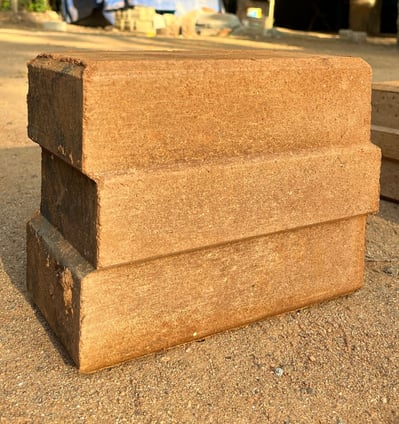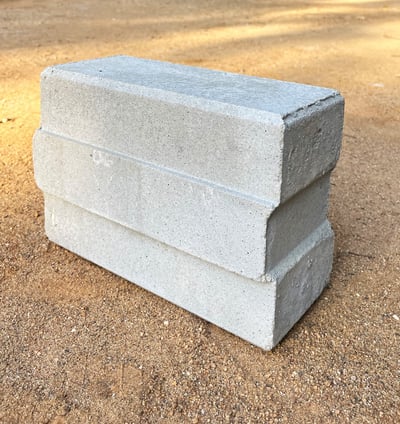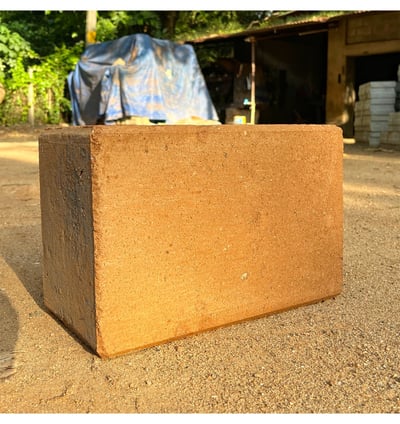TYPE OF BRICKS AVAILABLE
"Learn about standard interlocking sizes, how they impact design and durability, and how to choose the right size for your paving or construction project."
SOIL INTERLOCKING BRICKS






SIZE
10" * 8" * 5"
10" * 6" * 5"
CEMENT INTERLOCKING BRICKS
SIZE
12" * 8" * 5"
12" * 6" * 5"
M BRICK
SIZE
12" * 8" * 6"
Save 40% on Interlocking Bricks: Expert Guide to Sizes and Bulk Pricing
Did you know that switching to interlocking bricks can slash your construction costs by up to 40%? The interlocking bricks price in India varies from Rs 32 to Rs 50 per piece, which makes them a popular choice for budget-conscious builders.
These innovative interlock bricks deliver benefits that go well beyond cost savings. They produce zero carbon emissions during manufacturing and need only seven days to cure, compared to 21 days for conventional bricks. Their unique design provides excellent earthquake resistance and requires minimal skilled labor to install.
This piece will help you understand everything about interlocking brick sizes, bulk pricing strategies, and expert negotiation tactics that maximize your savings. You'll learn how different materials and manufacturing methods affect costs, which helps you make smart decisions for your construction project.
Interlock Brick Sizes and Their Cost Implications
Brick dimensions play a big role in determining their cost-effectiveness. Standard interlock bricks measure 254mm x 203mm x 127mm (10" x 8" x 5"), though manufacturers across regions use different dimensions
Indian markets commonly use interlocking bricks sized 254mm x 203mm x 127mm. These bricks' prices start at Rs32 per piece and can go up to Rs 55 based on material, application, and design . Builders prefer standard bricks measuring 254mm x 203mm x 127mm that cost about Rs 32
The market offers several other sizes:
· 10in x 8in x 5in soil interlocking bricks
· 10in x 6in x 5in soil interlocking bricks
· 12in x 8in x 5in cement interlocking bricks
· 12in x 6in x 5in cement interlocking bricks
A brick's size directly impacts construction costs. Larger units need fewer pieces to handle and mortar, which cuts labor costs This explains why interlocking bricks cost 35% less than conventional ones . The design also eliminates mortar joints, saving money on cement, sand, and labor .
These savings go beyond just materials. Masonry work with interlocking bricks reduces labor needs by 65-80% and speeds up production by 2.5-5 times compared to traditional methods . A cost analysis in Ghana showed that interlocking brick walls cost 24.38% less than standard hollow block walls .
The interlocking mechanism lets builders stack bricks without mortar. This feature cuts material costs and makes construction possible in cold weather without complex protection systems .
Building without mortar improves the structure's mechanical efficiency factor. Traditional brick structures have an efficiency factor of 0.3-0.4, but mortar-less interlocking brick structures can reach 0.96 . This means better compressive performance with less material.
Materials and Methods: How Size, Type, and Composition Affect Price
Raw materials and manufacturing processes play a key role in setting interlocking brick prices across markets. Material composition creates big price differences. A simple unit costs Rs 30, while premium options can go up to Rs 100
Fly ash interlocking bricks come from coal combustion byproducts mixed with cement and cost about Rs 55 each . These environment-friendly bricks have impressive strength between 75-100 kg/cm² . Their smooth surface means you don't need plastering . The only drawback is they soak up more water (15-20% of weight) than regular bricks.
Concrete interlocking bricks cost more at Rs 45 per piece . These bricks work great for houses and high-rise buildings because they can handle heavy loads . Dense and durable, they need less handling which cuts down labor costs.
The most affordable option is mud interlocking bricks at Rs 30-35 per piece . Clay, soil, and cement make up these bricks that provide great thermal insulation.
Manufacturing methods affect prices too. Hydraulically compressed earth blocks reach strengths above 8 N/mm² . This meets load-bearing needs without breaking the bank. These bricks need just 7 days to cure instead of the usual 21 days for regular bricks .
Different curing methods yield different results. Ponding gives the highest strength (10.8 MPa at 28 days) . Open-air curing doesn't work as well (8.35 MPa at 7 days) . Membrane curing works best when water is scarce.
Local factors affect prices in different regions. Indian interlock bricks usually cost between Rs 30-50 each . This varies based on local materials and production size. The best part remains unchanged - these bricks don't need mortar, which saves 30-40% in total construction costs .
Bulk Pricing Strategies and Supplier Negotiation Tactics
Smart negotiations with suppliers can lower your interlocking bricks price without quality loss. Buying in bulk remains the best strategy since vendors offer big discounts on large orders . Projects that need large quantities benefit quickly from these savings.
The price per unit goes down as you order more interlocking bricks. A standard interlocking brick in India costs Rs 45 per piece, but the price drops with orders of 1,500 pieces or more . Some suppliers need minimum orders of 10,000 pieces , so you'll need to plan your purchase.
Here are some proven ways to negotiate with suppliers:
· Research and compare multiple suppliers before committing. Prices range from Rs 35 to Rs 55 per piece based on type and location
· Plan your project ahead of time. Rush decisions lead to higher prices
· Choose reliable suppliers with a solid history. Companies like Star interlocking bricks , a 23 -year-old business, often provide better value long-term
The supplier you pick affects more than just the price. Quality manufacturers give guarantees and better terms because they're reliable . Industry data shows that picking the right supplier cuts material handling and overall costs by 20-40% .
Buying straight from manufacturers helps you avoid extra markups. Many suppliers let you request callbacks and fill out forms on their websites to discuss bulk orders . You can save even more money by installing the bricks yourself.
Bigger orders mean lower prices for interlocking bricks. Smart supplier negotiations can make your construction project 30-40% cheaper than using regular bricks. Budget-conscious builders should keep this in mind.
Conclusion
Builders can save money by using interlocking bricks in their projects. These smart building materials cut costs by needing fewer workers and no mortar. They also speed up construction time. The standard size of 245mm x 203mm x 127mm gives great structural strength at a reasonable price.
Your choice of materials will impact how well the bricks work and what they cost. Concrete versions are stronger and durable cost at Rs 40 each. Mud interlocking bricks are the cheapest option at Rs 28-32, perfect for projects with tight budgets.
You can cut costs even more by buying smart in bulk. A good strategy is to check multiple suppliers and plan your needs carefully. Negotiating prices based on quantity usually saves 30-40% compared to old building methods. These bricks need only seven days to cure and produce zero carbon emissions, making them perfect for modern construction.
Builders who understand different sizes, materials, and supplier options can make better choices that balance quality and cost. This approach will give great results while staying within budget. It shows you can build sustainably without spending too much money.
